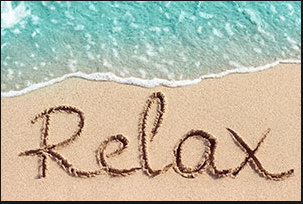Relaxation
What does relaxation mean to you and why is it so important? We are all such busy people that the thought of relaxation seems impossible. Even if you have the time to stop for a few moments and relax your body, most people are unable to relax their minds. Students talk about feeling stressed about exams, relationships, friendships, next steps and many other issues which impact their daily lives and are unable to switch off from this. Do you ever go to bed really tired, having spent the day yawning only to be wide awake for the next 2 hours, unable to fall asleep?
There are lots of tips and advice available to you on the internet which help you to relax, below is a list of the top 10 ways to relax;
- Be active- exercise creates endorphins which make you feel good. If you exercise this will lift your mood and help you to relax. Try it yourself, go for a walk, clear your mind and you will feel relaxed.
- Be present- try mindfulness, mindfulness is about being in the moment, about understanding your surroundings and creating a calm atmosphere. Think about something nice, your favourite place and imagine yourself there. What does it sound like? What does it smell like? How do you feel when you are there? Focus your mind and you will start to relax.
- Read a book- when your mind if focused on too many things, reading makes you focus the mind on one thing and helps you to feel calm. Read for 30 minutes before bedtime and see how you feel.
- Take a bath- soaking in hot bubbly water with some relaxing music and a few candles, you could even read your book (don’t drop it in the water!) this will help to calm your body as heat relaxes muscles, once your body feels less tense, your mind will start to feel calm.
- Listen to music- pick something easy going and light, music helps to calm the mind and lift your mood and this has been evidenced through many studies.
- Take deep breaths- when we feel stressed we tend to take short shallow breaths, this will increase our heart rate and make us feel agitated. By purposefully taking long deep breaths, we force our bodies to slow down, our heart rate decreases and our muscles relax.
- Have a massage, going to a beauty spa and having a full body massage might not be for everyone, but you could spend some time massaging your head or neck muscles yourself. You could also ask a friend or partner to massage tense muscles. Studies show that when our muscles are massaged, they become less tense, our cortisol (stress hormone) levels decrease and our body begin to relax.
- Try Yoga- we have a new Yoga therapy workshop taking place on Tuesdays @ 12:50pm to 1:30pm in the Dance studio in Elm. Come along and try the session. Yoga combines deep breathing, physical poses and meditation, studies show that Yoga is good for reducing blood pressure, depression and for relaxing your body and mind.
- Paint, draw, colour- studies show that colouring can help to reduce anxiety. Download some mindfulness colouring pages or by an adult colouring book and some crayons. This will help you to focus on one thing and help you to feel calm and relaxed, resulting in less anxiety and a quieter mind.
- Talk- spending time with friends and loved ones and talking can help you to relax, by talking through issues or focusing on something unrelated will help you to de stress and lift your mood.



